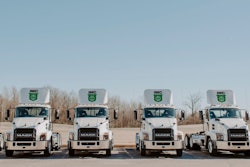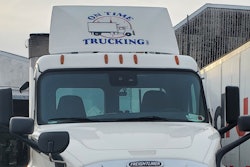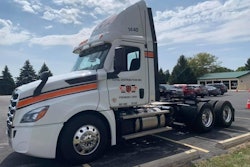There’s been some monster merger and acquisition deals in trucking the last few years – Knight-Swift’s acquisition of U.S. Xpress and TFI taking on Daseke, for example – and we’re only two months into 2024 and M&A activity is still pretty hot. You often hear whether a transactional marketplace is a buyer’s or a seller’s market, but in the case of trucking mergers and acquisitions last year and this year, Spencer Tenney, President & CEO of Tenney Group, says recent deals have been driven just as much by market uncertainty as shareholder value.
Contents of this video
00:00 10-44 intro
00:30 Mergers & acquisitions activity
01:16 Market uncertainty
02:49 Equipment value and freight rates
06:22 When will buyers get back in the game?
07:22 Selling points and risk mitigation
08:44 Diversifying your trucking company
10:09 Getting your trucking company ready for sell
Jason Cannon:
CCJ's 1044 is brought to you by Chevron Delo Heavy Duty Diesel Engine Oil. Now there's even more reasons to choose Delo.
There's been some monster merger and acquisition deals in trucking the last few years, but is it still a buyer's market?
You're watching CCJ's 1044, a weekly webisode that brings you the latest trucking industry news and updates from the editors of CCJ. Don't forget to subscribe and hit the bell for notifications, so you'll never miss an installment of 1044.
Hey everybody. Welcome back. I'm Jason Cannon and my co-host is always on the other side is Matt Cole.
Last year we saw some huge M&A activity. Knight-Swift's acquisition of U.S Express and TFI taking on Daseke are just a couple of the big ones that come to mind.
Matt Cole:
We're two months into 2024 and M&A activity is still pretty hot. PS Logistics has continued its streak of acquisitions, and the big deal so far has been Ryder's acquisition of Cardinal Logistics. That's two CCJ top-fifty carriers getting together.
Jason Cannon:
You often hear about whether a transactional marketplace is a buyer's market or a seller's market, but in the case of trucking mergers and acquisitions, last year and this year, Spencer Tenney President and CEO of Tenney Group says that recent deals have been driven just as much by market uncertainty as they have by shareholder value.
Spencer Tenney:
I think that the principle characteristic was instability, which was not beneficial to either a buyer or a seller in that situation. When you don't know when the bottom's going to hit in terms of the freight market and you've got the cumulative of a dozen interest rate hikes over a very short period of time, fastest rate of multiple interest rate hikes in 40 years. What that does is it creates angst in terms of putting capital to work. You don't need perfect conditions for capital to go to work. You just need stable conditions. And I think that was what was challenging for both buyers and sellers.
We had a lot of deals where you had a willing seller and a willing buyer at the table, but it was such a moving target. They basically in the interest of conserving resources and not taking their eye off their primary business, they needed to press pause on a lot of deals. And I would say that was one of the more principle characteristics of the whole year. It was just very challenging to get alignment largely because of macro issues, and it's not always that way.
I think that there were a lot of folks that buyers desperately needed to get a deal done and wanted to pay a fair price, but to try to get alignment both from buyers and sellers, a buyer's board, maybe they have an investment committee, it's very difficult to get aligned on valuation and deal structure when you still have a lot of moving parts going on in the market. And so a lot of deals that should have taken place, and a lot of folks wanted to take place, in 2023 ultimately pushed into 2024.
Matt Cole:
Some of the deals that under better economic circumstances might have closed in 2023, face a different economic climate in 2024 because, for better or worse, equipment values are normalizing and rates and volumes are stabilizing.
Spencer Tenney:
I would say the first two months of 2024 are very different from the first two months of 2023, and what we're seeing is we're seeing a lot of sellers that have really been on this roller coaster ride for the last call it three or four years intended to exit pre-COVID, but then caught up in this wave of both good and some challenging times that made it difficult to make their exit from this industry.
And so I think there's a lot of folks that largely because of macro pressures have recalibrated in terms of what their valuation expectations are. I think they're coming to the table in a much more collaborative posture. I think that's notably different from what it was in 2023 where we're still pretty cavalier in terms of both equipment values, still decent interest rates. They were changing rapidly. But I think a much more educated and constructive attitude about getting a deal done from the position of the sellers.
And the buyers, I think that they're anxious because they've been waiting to have a stable environment. So, here we're five months without an interest rate hike according to USA Today, and that's meaningful. What that means is, "Okay, we can get alignment on a board level that we can go put capital work," especially if the Fed is signaling that maybe in March or even in May, we might start seeing interest rate reductions.
All of that is... That's all that we need for investors to go get back in the game and get back in the game aggressively. So, those are a couple of characteristics that we're seeing the first two months of 2024.
Jason Cannon:
If you're set in your wise for when wheeling and dealing season might get heated up again, stick around after this word from our sponsor, Chevron Lubricants.
Speaker 4:
These past few years have been less than easy. We've encountered challenges we never imagined we'd ever have to deal with. From makeshift home offices and video meetings to global supply chain uncertainty, price instability, market disruptions, and everything in between. Delivering the level of services and products our customers had come to expect was difficult for all of us.
We can't change what's behind us, but we can definitely learn from it. We can adapt, evolve, and take steps to reset our thinking. Adapt our strategies, and restore your trust in us to better meet your needs, now and in the future. That change begins today.
Today we break with convention and introduce a rebalanced line of Delo Heavy Duty Engine Oils. We've reduced our product line from four categories to two. Consolidated and simplified, this lineup removes complexity from the manufacturing processes, enhancing price stability and supply chain reliability so you can trust you'll have the premium products you need to keep your business always moving forward.
Our break with convention optimizes the Delo lineup to allow you to provide your customers with the best synthetic blend and synthetic heavy duty engine oils in the market, fully available at prices you can rely on. It's your assurance that you'll be well positioned to be their trusted source for proven engine protection that keeps equipment on the job, giving your customers even more reasons to choose Delo.
Spencer Tenney:
I think probably in April, April we'll start seeing notable freight market favorable enhancements, and it won't be overnight as you suggest. It'll be gradual, but I think it'll be enough to materially affect buyers getting back in the game and be much more comfortable putting more higher concentration of cash at close. Whereas, probably of the last year or so, much more sensitivity about structuring deals with heavy earn outs and understandably so.
I think that's where you're going to see... Once we get consistent changes in terms of where the freight market is, it doesn't have to be a lot, but if a couple of month over month steady increases and what's dropping down to the bottom line, then you're going to see significant changes in the way the buyers are structuring deals. Primarily, they're going to be more comfortable delivering offers with higher concentration of cash at close, which that is going to be extremely helpful to get sellers on board with the deal.
Matt Cole:
In an unstable market, potential buyers are less interested in potential multiples of revenue post-close. One of the biggest selling points right now is how safe and stable is the target business and how easily could that operation be folded into the parent company.
Spencer Tenney:
The things that are the flavor of the month or the flavor of the year, and it's more about what has insulation from broader macro things that can deteriorate business value. And so it's more about risk mitigation, and we see that all over the place. Right now, we see some of large public, large private equity backed strategics completely... It's less about the vertical, it's more about the profile. Does it have insulation? Is it has some type of niche expertise, and if it does, they're more interested in the risk mitigation than the growth potential in this type of environment.
Whereas, if they're looking for a platform, it has to fundamentally have a clear path to grow. So, I think an environment like this where it's not quite as stable as other markets, you're going to see most of the acquisition activity focused around tuck-ins or diversifying into adjacent markets, relying on and investing in established niche expertise. And then the trade-off is maybe it doesn't grow as fast, but the earnings are insulated and it's another way to create value.
There's a couple of different ways why people might want to do that. Maybe they have a customer that has diversified needs and so a way for them to grow cost-effectively is to expand the way that they serve existing customers. And so what they might do is they might grow rather than trying to reinvent the wheel, and to use your point, maybe they're down the middle over the road drive in, but they want to pick up some refrigerated hauling. Rather than trying to figure that out, maybe let's just go acquire somebody that already has that expertise and roll it into what we're doing.
That happens. That's more likely. But people just don't arbitrarily say, "We need to diversify for the sake of diversifying and start doing all these things that we don't know, don't really have any core competencies in."
And so, I think the better thing is if you have high customer concentration, you [inaudible 00:09:35] to get other customers. You need to diversify through that manner, or spread your risk across different industry verticals. Maybe it could be driving, but maybe you're all in the same categories, so you want to kind of diversify through different types of industries that you're serving. And so in doing so, you accomplish the same thing by de-risking the business.
In general, over the last three years I think that has... The whole element of diversification for the sake of de-risking the business has been a core characteristic of that has been driving acquisition strategy.
Jason Cannon:
April, when Spencer says he expects M&A activity to pick up a little is just around the corner. And if you're thinking about an exit, how do you get your trucking company ready for sale?
Spencer Tenney:
I think number one is educate about the process. So whether it's my podcast or whether it's articles or whether it's publication, there's a variety of different resources to begin learning about the processes.
One of the first things that you're going to learn is depending on the buyer type, they're going to have a completely different investment thesis about what your business is worth. So, one of the most limiting things that you could do is to say, "Do you want to buy my business?" Because then you've effectively reduced and marginalize the way that an investor can even think about it.
And so when we're running a process, this is not just to plug what we do, but this is the realities of what we do. When we do the research and we understand who should buy the business, let's just say we narrow that down to 20 and 30 parties across the entire nation, the people that have the most to gain by doing it, well, each of those buyers might have a very different reason for doing it. And the key is to position the business to tell a narrative that solves that problem for that particular buyer.
And when you're doing that, then the business is worth what it's worth to that buyer. And that's much different than just, "What's it worth?" To say, "What's it worth," is a very limiting question. And so for what we're trying to do is, what does the market say that it's worth based on multiple different problems that buyers are trying to solve, what pain points that they're dealing with right now?
Because ultimately, we have this happen all the time. Somebody has a very pronounced problem within the organization. Maybe they just had a horrible integration, they're losing money, and the only solve is to go buy my client's business. Well, we're looking at a totally different range of financial outcomes because of that very specific situation.
So, the key is educate yourself about the process. Don't do anything to limit it.
You have to protect confidentiality. So, number one, you can't go shop your own business, number one, because once the cat's out of the bag... You can't put toothpaste back in the tube. That's a problem. And that can be very damaging to your employees, people that you care about. There's no need for them to know that information until something's for real.
And then you have to have a strategy. You have to be able to support the documentation. I think that's one of the main things. I think a lot of folks dramatically underestimate what will be required to not just get a buyer interested and put on a piece of paper what they think the business is worth. It has to withstand the scrutiny of multiple third parties to actually... For you to get paid.
And so I think that doing your homework, educating about the process, running dry runs with your organization to make sure that you can produce the right information in real time. I think that's the key to differentiating from the rest of the pack and ultimately being able to get paid.
There's a couple of suggestions.
Jason Cannon:
That's it for this week's 10-44. You can read more on CCJdigital.com. While you're there, sign up for our newsletter and stay up to date on the latest and trucking industry news and trends. If you have any questions or feedback, please let us know in the comments below. Don't forget to subscribe and hit the bell for notifications so you can catch us again next week.











